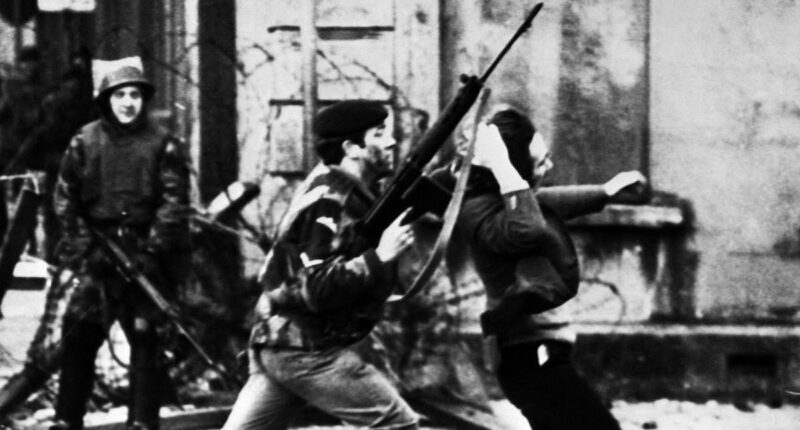Share this @internewscast.com
Veterans have labeled a new agreement between Britain and Ireland on the Troubles as a ‘betrayal’ after it surfaced that it might lead to more soldiers who served in Northern Ireland being prosecuted.
The recently announced ‘framework’, revealed at Hillsborough Castle near Belfast by Northern Ireland Secretary Hilary Benn and Irish Tanaiste [Ireland’s Deputy Prime Minister] Simon Harris, is an extension of Labour’s promise to overturn the Conservative’s 2023 Legacy Act.
The Conservative legislation, initially spearheaded by then Veterans’ Minister Johnny Mercer, effectively paused numerous civil lawsuits and inquiries, providing conditional immunity for those accused of crimes during the Troubles if they cooperated with a truth recovery initiative. However, it was declared illegal by Belfast’s High Court last November.
Former Lance Corporal Soldier F, presently on trial for his role in the infamous 1972 Bloody Sunday killings in Londonderry, faced charges before the implementation of the 2023 Act.
The agreement with the Irish government, after nine months of discussions, terminates immunity for terrorists, which was controversially extended by the Blair administration to 187 pro-IRA individuals, and establishes six ‘protections and rights’ for veterans. However, it also removes their immunity.
Soldiers who are now in their 60s and 70s could now face fresh inquiries leading to criminal charges decades after the events in question.
Ex-SAS reservist and Tory backbencher Sir David Davis described the move as a path to ‘victory for the IRA’.

A British soldier is seen pulling a Catholic protester during the ‘Bloody Sunday’ events on 30 January 1972, when British paratroopers fatally shot 13 Catholic civil rights marchers in Londonderry.
Meanwhile Paul Young, a former member of the Blues and Royals who works with the Northern Ireland Veterans Movement, called the plans a ‘betrayal of those who served with honour during the Troubles and a distortion of justice for victims of terrorism.’
Former Tory MP and Army captain Mr Mercer told the Mail that it was ‘hard to watch this Government steadily walk back every gain I made for veterans over the previous five years’.
And James Cartlidge MP, Shadow Defence Secretary, added: ‘Labour’s announcement opens the floodgates to a new wave of vexatious legal action against our veterans – threatening the Army’s morale just as we face the most profound military threats since the Cold War.’
Today’s announcement came as a bitter blow to veterans who wanted an end to persecutions over operations against terrorists decades ago.

British Secretary of State for Northern Ireland Hilary Benn and Ireland’s Tanaiste Simon Harris speak to media following the publication of the new joint framework

Tory MP and ex-SAS reservist Sir David Davis fears the changes may mean ‘victory for the IRA’
A number of new inquests, which had been stopped under the previous legislation, will now go ahead and civil cases can also be reopened.
Cases which could be examined include a daring SAS mission to prevent IRA troops targeting the Loughgall police station in 1987.
Eight terrorists were killed by the brave troops who stopped a digger truck with explosives in its bucket. Afterwards, republican groups complained the terrorists had not been given sufficient opportunity to surrender.
Such cases are at the centre of the Mail’s Stop the SAS Betrayal campaign to improve human rights for soldiers.
More than 200,000 people have signed an online petition calling for veterans to be protected from persecutions.
Sir David said: ‘One such inquest will likely concern the events at Loughgall. If that happens, it will be read as a victory for the IRA.
‘At Loughgall the heavily armed IRA gang attempted to murder police officers. The SAS’s actions found to be entirely legal by the Director of Public Prosecutions.’
Mr Davis said the Irish government, which will be part of a reconciliation framework with the UK ‘is not a neutral participant’.
Lt-Col Richard Williams, former commanding officer of the SAS and veteran of Northern Ireland, said the plans ‘deliver no real reassurance to veterans, and pledges to continue with the inquest-led reopening of investigations.
He added: ‘This is another hard punch in the face for the Veterans and yet more sovereignty being lost. The only people that will be happy with this is Sinn Fein/IRA and the lawyers.’
Sinn Fein said it would ‘closely scrutinise’ the new framework.
The new plans unveiled today include replacing the Independent Commission for Reconciliation and Information Recovery (ICRIR), a truth recovery body, with a judge-led Legacy Commission.
Investigations ‘will be capable of leading to prosecutions where there is evidence of wrong-doing.’
But veterans will not have to travel to Northern Ireland for inquests if they are witnesses and can give evidence remotely. They can also to apply for anonymity and they will no longer be served with court orders on their doorsteps. The commission must also take into account ‘health and wellbeing of witnesses’.
Veterans Minister Al Carns, a former senior Army officer, said last night: ‘The previous legislation, which one could argue was well intentioned, and not well thought through. It was found to contravene UK law and the European Convention on Human Rights. I’ve engaged with veterans’ associations and these are protections they have asked for.’
He added: ‘I think Loughgall will likely come under the Legacy Commission, because a large part of the evidence has to be redacted. It would take really significant evidence for this to lead to any legal action.’
Mr Benn said the deal offers an opportunity to deal with the ‘unfinished business’ of the region’s peace agreement, while Mr Harris claimed the new proposals were ‘night and day improvements’ on the 2023 Act, which was opposed across Northern Ireland’s political divide.
The agreement comes as the trial of Soldier F reaches a potential pivotal moment. A judge will rule next week whether statements made by other soldiers at the time can be adduced in evidence in the trial. His barristers are expected to ask for the case to be dismissed if the judge rules the statements are inadmissible.
















